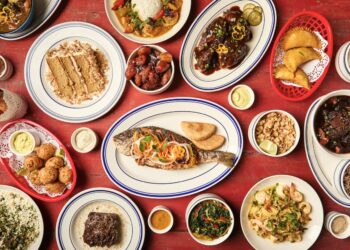 Saudi Arabia’s catering services market is expected to experience significant growth over the coming years. Under the Saudi Vision 2030, the government plans to spend heavily on its non-oil sectors such as infrastructure development, healthcare, education, and several others. This, in turn, will generate demand for catering services in the Kingdom. Furthermore, the increase in demand for religious tourism will also drive the catering industry.
Saudi Arabia’s catering services market is expected to experience significant growth over the coming years. Under the Saudi Vision 2030, the government plans to spend heavily on its non-oil sectors such as infrastructure development, healthcare, education, and several others. This, in turn, will generate demand for catering services in the Kingdom. Furthermore, the increase in demand for religious tourism will also drive the catering industry.
In this feature, we interview Dany Chahine, Business Manager – KSA, Nestlé Professional.
- Please tell us more about your company and role.
I have assumed different roles in Nestlé since 2011, in both retail and Out Of Home divisions. Currently, I overlook Nestlé Out-of-Home business serving HORECA channel, Travel, Workplace & Education.
At Nestlé Professional, we continuously strive to become an Inspirational & Trusted Partner for our Out-of-Home customers, enabling them to delight their consumers .
We see it as our mission to utilise our expertise in providing efficient, innovative food and beverage solutions to all our business partners and helping them win by Making More Possible.
We continuously invest in fostering our understanding of customer and consumer tastes, experimenting and innovating to enhance product performance, and relentlessly developing solutions to the latest nutritional and sustainability commitments.
- What are some of the unique advantage points of your brand and how does it stand out in the Saudi Hospitality/Catering landscape?
For Food products, we use our local and global industry insights along with our branded culinary & dessert solutions to create and deliver profitable business solutions for our partners through great taste, consistency and convenience.
This is the expertise we put in the hands of chefs, operators, restaurants and entrepreneurs across the OOH sector.
Our portfolio includes many established brands such as MAGGI®, KITKAT®, NESTLE®, NESTLE DOCELLO®, and NIDO®.
When it comes to Coffee, from its beginnings in the 1930s to the present day, NESCAFÉ® is known to be the #1 global and most popular coffee brand.
NESCAFÉ® brand grown respectfully; guarantees the future supply of coffee through responsible farming and sustainable production.
Today, we are delighted to have a STARBUCKS Branded Solution as part of Nestlé, having a richer black cup and variety of white cup selections, delivering consistent quality cup after cup.
- How have you evolved this year and how has the pandemic transformed your strategy?
The next normal is going to be different. It will not mean going back to the conditions that prevailed in 2019. In 2021, there’s no going back. The great acceleration in the use of technology, digitization, and new forms of working are going to be sustained and we are leveraging on e-commerce and the rise of cloud kitchens to accelerate our Recovery in the OOH channels.
As part of our Transformation journey, we have recently launched SWEET EARTH, plant-based burgers and schnitzel targeting consumers with increasing awareness for meat alternative products and high demand on healthy offerings. Plant-based diets are no longer just for vegetarians and vegans. More and more people are becoming flexitarian in their eating habits –
choosing to reduce their meat consumption at some or even all their meals and lowering the environment footprint of their diet.
We are also entering the world of Beans with the Nescafé brand to address growing consumer demand, as they are becoming more sophisticated in their coffee knowledge. Millennials are developing more advanced tastes in terms of coffee quality, diverging from basic soluble coffee towards consumption that is more oriented towards beans and specialty coffee.
- As travel and tourism recover, what are you expecting to see and how are you aligning with regional and global shifts?
The tourism industry in Saudi Arabia is changing drastically, with public and private sector efforts focused on diversifying the tourist base and purpose of travel to the Kingdom (away from business and religious tourism).
In the long run, this is expected to result in a significant shift in the Kingdom’s retail and F&B landscape as part of the government’s modernization and economic diversification efforts. Planned investments in the entertainment sector will also have a major impact on the quality and diversity of Food & Beverage concepts in the Kingdom.
From another angle, the pandemic played as well a major role in the industry landscape; the crisis sparked a wave of innovation and disruption creating a space for new entrepreneurs: think of the restaurant chef turned caterer to survive and he succeeded, then he became an entrepreneur.
Vision 2030 envisages that household spending on domestic entertainment will increase from 2.9% of total expenditure in 2015 to 6% by 2030. The planned increase in the number and size of sporting events and concerts will also have positive implications on the foodservice sector. This is already resulting in a proliferation of mobile food and beverages businesses and food trucks.



































































